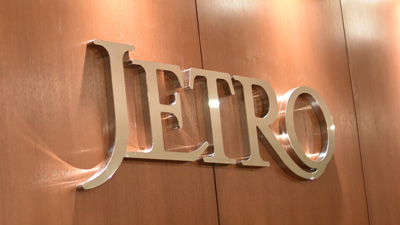Successful Collaboration How Japanese corporates are teaming up with international startups (Fujitsu×Quantstamp)
June, 2019

Kiyoshi Anzai, from Fujitsu’s Business Development Division (r) and Kei Oda, Regional Manager, APAC for Quantstamp (l)
Japan’s large corporations are typically seen as conservative and domestic in their business strategy. However, a major change has been taking place over the past few years. Sensing the limits of only developing new services and products in-house, corporations are now pursuing business development and investment opportunities with startups.
This promising new trend is not limited to local, Japanese startups either. In 2018, Quantstamp, a Silicon Valley startup and Y Combinator graduate, entered the Japanese market where they met with Fujitsu, known locally for running one of the first Japanese corporate accelerators looking into new business collaborations with startups. Together they are now embarking on an exciting cross-border collaboration. For more details, take a look below.
- Collaboration
- 2018
- Destination
- Tokyo
- ICT
-
USA
Please tell us a bit about your companies.
- Kei Oda, head of Japan and APAC, Quantstamp Inc.
- Quantstamp is a blockchain security company with offices in San Francisco, Toronto, Tokyo and Taiwan. We are especially focused on smart contract (※1) security. Smart contracts are pieces of software made by people so vulnerabilities due to human error or bugs may be found. Those vulnerabilities have been the root cause of various major hacking incidents in the past. Our team is working on code audits and reviews to prevent those kind of hacks from occurring in the future.
- Kiyoshi Anzai, Business Development Division, Fujitsu, Inc.
- Fujitsu is Japanese technology vendor. We have an 83 year history and were ranked by revenue as the 7th largest vendor in the world - and number one in Japan - in 2017. More than half of our US$36 billion yearly revenue comes from system integration. However, we do not intend to simply continue focusing on that. When we began to explore new ideas, we attended a lot of tech events and met many entrepreneurs. We realized that there are many startups which aim to change the world and are also pushing the boundaries of cutting edge technology. There are a lot of benefits for both startups and large companies like us if we work together. In order to create those sort of business opportunities we started the Fujitsu Accelerator Program from April 2015.
How did your companies meet?
- Oda:
-
When we were deciding where to put our Asia office, we thought Japan was the right choice because it was very positive towards cryptocurrency and blockchain (※2). We entered the market in January 2018 and we made a commitment to join Plug and Play Japan’s program (※3). Afterwards we were then selected to join the Fujitsu Accelerator Program.
After we entered Japan, industry conditions changed a bit. Larger companies are still forward thinking when it comes to blockchain, and require a proof of concept (POC) from blockchain companies. Outside of Japan, we meet and work with many companies who are already in our industry. In Japan, however, we engage with many corporates like system developers and financial institutions. They want us to help determine the viability of the blockchain projects they are considering.

- Anzai:
- We started as a partner of Plug and Play in America, and when they brought the program to Japan, we joined here as well which is how we met Quantstamp. We then met Richard Ma (Quantstamp’s CEO) through meetups hosted by Hyperledger (※4), a blockchain consortium in which Fujitsu is a premium member. We also both happen to be members of the blockchain co-working space Neutrino (※5) and end up seeing each other there a lot.
- Oda:
- Japan’s blockchain industry is still young and growing. It is not so large which means we have had a lot of chances to meet with Fujitsu. Also, and this is something I learned after coming here, many large corporations consider integrating this sort of technology, even a comparatively open and transparent distributed application platform like Ethereum, to be challenging. That is why you see so many companies joining a consortium like Hyperledger where it is easier to conduct proof of concept projects. For Quantstamp, it is not just an issue of handling Ethereum. We believe it is necessary to provide support for a wide variety of platforms. When we saw how much Fujitsu was using Hyperledger we knew we needed to make a strategic partnership. We met a lot of companies, but we connected the best with Fujitsu, where software is at the core of their business.

Please explain the process behind making your successful collaboration
- Anzai:
-
We run our accelerator once or twice a year. We start by taking applications from startups that match the business areas we chose to highlight. The startups that pass the document review then proceed to the pitch contest. This is where the startups can explain their product to a room full of Fujitsu business division leaders. If even one division indicates they want to explore a partnership, then the startup goes on to begin concrete discussions. The important thing about these talks is they include the decision makers. That means startups can avoid a situation where they have positive talks with mid-level managers only to find out the division head is not interested in pursuing the business proposal.
Quantstamp joined the 6th edition of the accelerator. Because their service is so advanced, there was a risk that the business divisions would think that the timing was too early for Fujitsu to step in. On the other hand, it is precisely because Quantstamp has surpassed the products currently available, we understood the importance of partnering with them. We mainly focused on finding ways of helping the Quantstamp team and decided to use the 3 month program to tap on our own client base to help them improve sales in Japan.
In addition, Quantstamp establish a global consortium called the Smart Contract Security Alliance (※6) in March 2019. Fujitsu will be a member from the start and together we will work on defining what security means in today’s technological world. - Oda:
- Right now the biggest issue facing blockchain is that there isn’t a proper definition of security. “What is secure? What is not secure?” are questions for which our industry still needs a global standard. By setting up the Smart Contract Security Alliance, we intend to debate this issue and make announcements as a group. We feel that Japan should be taking a leadership role in blockchain and are very happy that Fujitsu has joined the alliance.
- It is also worth noting that it is rare for Japanese companies to visit the international headquarters of startups, but the Fujitsu team came to our main office and met with our CTO. That helped show us how serious they are about making this work.
What is the difference between Japanese and non-Japanese companies?
- Anzai:
- There are many strong Japanese startups, but looking globally we see a greater number and stronger quality of startups. We will definitely continue to approach startups outside of Japan. Most of our business units are based in Japan and we match them with local startups. However, we believe it is essential for us to also work with startups making services that are outside or surpass our current businesses. Quantstamp is the most recent example of that.
- Oda:
-
A big difference is the emphasis that Japanese companies put on relationships. It can take some time to build trust, but once someone is your partner, they will support you for the long haul. That is a big plus for doing business with Japanese firms.
In other countries, it is possible to get an agreement in only two meetings but the relationship might end only one month later once the project is completed. That sort of transactional approach can also be good, but we are looking at Japan as part of our long-term strategy so we have a deep appreciation for how Japanese companies come to view us as equal partners.
As part of the relationship building, our CEO has been coming to Japan about six times a year. As a foreign company it is also important to show that sort of commitment.
What are your companies planning for the future?
- Oda:
-
25 years ago everyone knew that the internet was revolutionary but at that time it was not practical. It still took ten minutes to download a single image. Blockchain is in the same position now and it is further complicated because it is often lumped in with cryptocurrency. Even so, it probably won’t take 25 years before various industries are using this technology. For that reason, as a security and infrastructure compan, we are working to quickly eliminate the distance from blockchain that people feel. We believe we can achieve this goal even faster because we are working with a company like Fujitsu which has already built a strong foundation.
The Japan startup scene continues to grow but there are still many large companies that don’t take a collaborative approach or only want to consider a startup for a potential future acquisition. We were very impressed not only with the speed of Fujitsu accelerator program but also how they act as partners walking together throughout the process.

- Anzai:
- Blockchain is still centered on proof of concept and is slowly moving towards real usability for businesses. With the automation that smart contracts provide, we anticipate major changes - like the decline of 3rd party sellers - to how ICT services do business. When that time comes, it will be absolutely necessary to have proper security and review technology in place. Quantstamp found the opportunity for this technology and we are excited to work with them to develop the know-how and provide a new service.
How do you see the future of Japan’s startup ecosystem?
- Anzai:
- Right now there is a big expansion of corporate accelerators and venture funds especially in Tokyo. It is still not at the level of the USA, Europe, or China, but it is very positive to see more companies using their resources to partner with startups as opposed to keeping everything in-house. I think we will see more partnership development programs like ours in the future. More and more corporations are understanding that they won’t be able to keep doing things the same way they have in the past. With the startup ecosystem also strengthening, that will create more opportunities for corporate-startup business development.
- Oda:
-
There still are not so many Japanese startups that go overseas, but we are starting to see some growth in startups expanding into Southeast Asia. I hope we also see more trying to crack the US and European markets. On the other hand, it can be tough for startups looking to enter into the Japan market, but organizations like JETRO are offering support. We did not know this when we started so we spent a lot of time and did everything ourselves.
There are a lot of examples of Japanese business people taking a successful, foreign business model and building a similar, also successful, one in Japan. Localization is important, but Japan is a very appealing market.
However, with the decline of life-long employment at corporations, I feel that the number of people who want to try and do a business themselves is growing. Getting started in Japan might be tough, but there are many talented people here. As for Quantstamp, we are really benefiting from being in Japan.
(Interview Date: March 15, 2019)
FUJITSU LIMITED
- Established
-
1935
- About Fujitsu
-
Fujitsu is the leading Japanese information and communication technology (ICT) company, offering a full range of technology products, solutions and services. Approximately 140,000 Fujitsu people support customers in more than 100 countries. We use our experience and the power of ICT to shape the future of society with our customers.
- Employees
-
140,365 worldwide (as of May 2018)
- Locations
-
Tokyo, Washington, New York, Hawaii, Colombia, etc.
- URL
- Fujitsu Accelerator Program
-
The purpose of the program is to combine the technology and products of innovative startups with the ICT products and service solutions of Fujitsu to provide new value to the world. As of 2018’s Batch 6, 100 startups have been matched with business divisions and 63 business collaborations have reached.
More details (Japanese only)
(Japanese only)
Quantstamp, Inc.
- Established
-
2017
- About Quantstamp
-
Quantstamp is a blockchain security company developing automated security tools such as the Quantstamp protocol and also conducts manual smart contract audits. Powered by QSP, the Quantstamp protocol aims to enhance smart contract security and the reputation of projects that create smart contracts by producing openly accessible security reports.
- Employees
-
35
- Locations
-
San Francisco, Toronto, Tokyo, Singapore
- URL
Reference
- ※1 :
- Smart Contract - A programmatic contract where contracts that fulfill all relevant requirements can be executed between two sides without the need to go through a third party.
- ※2 :
- Blockchain - Technology that analyzes, manages, and shares blockchain trading data. It is effective at preventing data errors and system disruptions.
- ※3 :
-
Plug and Play Japan
 - The Japan branch of the global VC and accelerator
- The Japan branch of the global VC and accelerator
- ※4 :
-
Hyperledger
 - An open-source community supporting blockchain technology
- An open-source community supporting blockchain technology
- ※5 :
-
Neutrino
 - A co-working space for the blockchain industry. It is a joint-venture between the online payment system provider Omise and the Japanese VC firm Global Brain. It currently operates in Tokyo, Singapore, Shanghai, and Beijing.
- A co-working space for the blockchain industry. It is a joint-venture between the online payment system provider Omise and the Japanese VC firm Global Brain. It currently operates in Tokyo, Singapore, Shanghai, and Beijing.
- ※6 :
-
Smart Contract Security Alliance
 - A global industry organization making the definitions and guidelines for smart contract security
- A global industry organization making the definitions and guidelines for smart contract security
Explore More
-

Success Stories
Success Stories are based on interviews conducted with foreign companies and foreign-affiliated companies that have successfully come into the Japanese market.
-

JETRO’s Support
We provide consistent one-stop service for establishing a base or expanding business in Japan.
-

Setting up Business
You can find information on overall and detailed steps, cost estimation, an overview of the laws, regulations and procedures related to setting up business, and more.
Contact Us
Investing in and collaborating with Japan
We will do our very best to support your business expansion into and within Japan as well as business collaboration with Japanese companies. Please feel free to contact us via the form below for any inquiries.
Inquiry FormJETRO Worldwide
Our network covers over 50 countries worldwide. You can contact us at one of our local offices near you for consultation.
Worldwide Offices




























